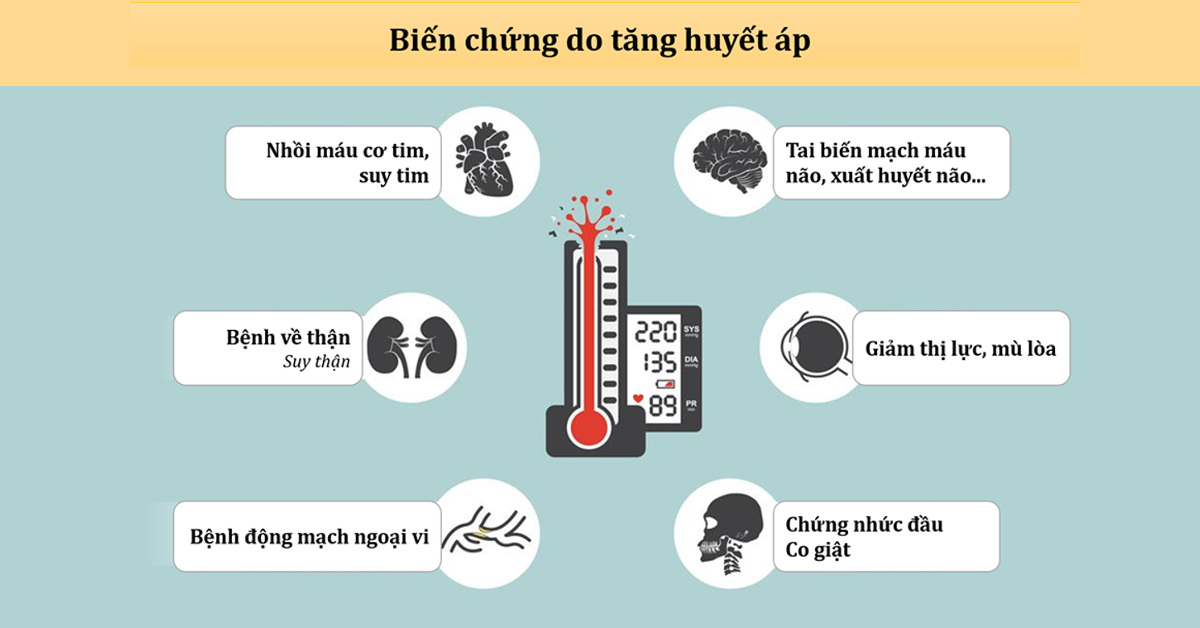Primary idiopathic hypertension is the most common type of hypertension. It's called idiopathic because doctors can't pinpoint a specific cause of high blood pressure. Idiopathic hypertension accounts for up to 95% of cases and complications develop over time.
Complications due to idiopathic hypertension
Idiopathic hypertension in particular and hypertension in general, if not properly and adequately treated, will leave many serious complications, even death, for patients. Common complications of primary idiopathic hypertension are:
Complications in the heart: High blood pressure causes the heart to work too hard, the higher the blood pressure, the more the heart muscle has to pump, more effort. Over time, the heart is dilated, to a certain extent, it will increase the risk of arrhythmia, heart failure, heart attack, stroke, ...
Brain complications: The brain, like other organs in the body, needs oxygen-rich blood to be pumped by the heart to function properly. Hypertension reduces blood supply to the brain, causing transient ischemic attacks. If the blood flow is significantly blocked, long-term can cause brain cells to die, causing a stroke. Uncontrolled hypertension can also affect the brain's ability to remember, communicate, and reason.

Permanently damaged arteries: Healthy arteries help blood flow well, unimpeded. Long-term high blood pressure causes arteries to damage, becoming less elastic and stiffer. Therefore, fat in the blood also easily accumulates in the arteries, gradually restricting blood flow, causing blockages, hypertension, heart attacks and strokes.
Complications to the eyes and kidneys: When blood pressure increases, it will lead to increased filtration pressure on the kidney organization, gradually causing kidney failure. In the eye can cause complications of fundus edema, fundus bleeding, vision loss, blindness.
Tips to prevent hypertensive disease
Weight control: People who are overweight or obese are more likely to develop high blood pressure than people of normal weight. Therefore, if you are overweight and have a big belly (for men, it is over 90cm), it is necessary to exercise and apply a scientific weight loss regime by limiting starch, sugar, fat and increasing vegetables. green, fruit as well as drinking enough water every day.
Scientific diet: Eat enough meals, do not eat too much or too late. In the daily diet, it is necessary to actively use foods that support the prevention of hypertension such as: Add green vegetables and fruits (oranges, apples, avocados, dragon fruit, bananas, watermelons,…) all contain a lot of vitamin E, C or potassium to help prevent high blood pressure effectively. In addition, supplementing with raw grains (brown rice, bo bo, corn, oats, black bread ...) helps to prevent constipation, fiber, limit the absorption of cholesterol into the blood, prevent atherosclerosis and enhance the ability to secrete bile acids to support digestion. To supplement protein, it is best to use fish instead of meat, especially 2-3 times a week because fish contains many unsaturated fatty acids, which help lower blood cholesterol. To reduce cholesterol, you should use unsaturated fats from olive oil, corn oil, sunflower oil, soybean oil... In addition, replace fried, stir-fried foods with grilled or steamed foods for better health.
.png)
Note to avoid foods that can cause high blood pressure such as: Salty braised foods, salty sauces, foods rich in sodium such as salted duck eggs, cotton balls,…; Fried foods, egg yolks, skin or internal organs, and bone broth; Avoid foods and fruits with a lot of sweetness such as confectionery, soft drinks, jam, mango, longan, jackfruit, lychee,...; Protein from beef, sheep, goat or dog will increase cholesterol leading to hypertension; Limit bacon, sausages because these are all foods that contain a high percentage of salt and preservatives; Limiting the use of stimulants such as coffee, alcohol, tea, hot spicy spices will stimulate nerves, cause insomnia, heart rhythm disturbances.
Exercise regularly: To prevent hypertension, it is necessary to plan to maintain exercise from 30-60 minutes/day and 5 days/week. Exercise also helps you stay away from stress - one of the causes of high blood pressure. The forms of exercise that are good for health can be chosen as walking, swimming, moderate sports...
Healthy lifestyle: Do not stay up late, make sure to get enough sleep every night. Maintain a healthy lifestyle, keep a good mood, avoid anxiety or nervous tension
Source: Dr. Huu Hanh - Health and Life Newspaper

See more product information here.